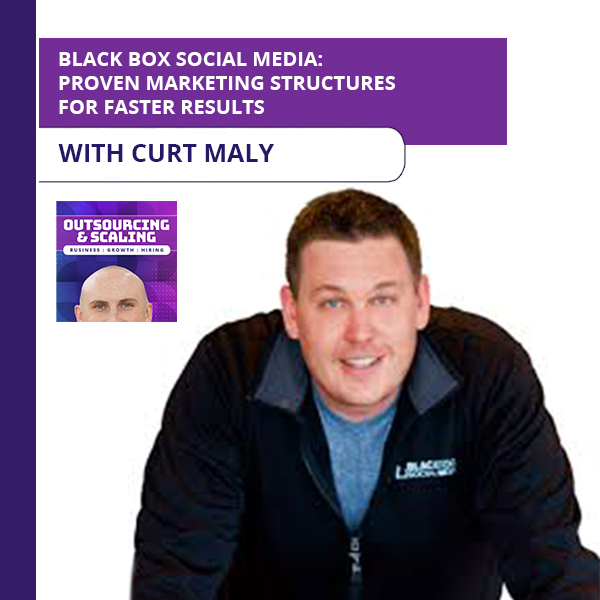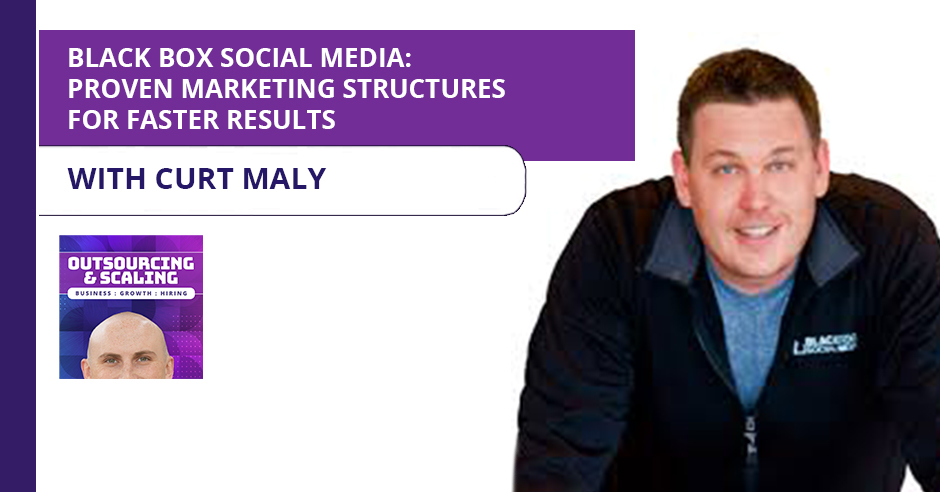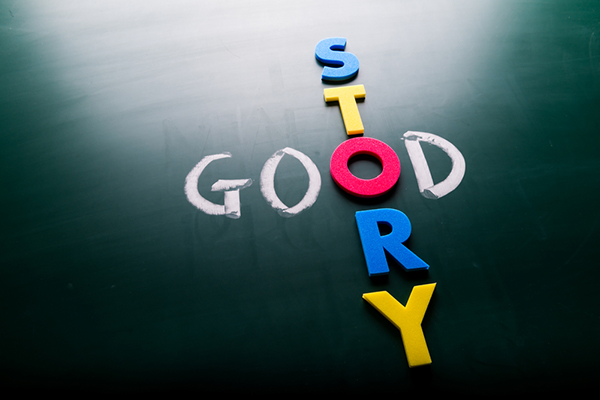


Facebook is without doubt a powerful marketing platform, and using it smartly for your business can generate promising results. In this episode, Nathan Hirsch interviews Curt Maly, the owner of the digital marketing agency, Black Box Social Media, and is one of the world’s most sought-after experts on Facebook, social media marketing, and paid traffic strategies that dramatically increase short term and long-term revenue. Walking us through his journey through the social media business, he shares some of his proven Black Box Secrets that you can implement in your business immediately for fast, scalable, and predictable profits.
—
Listen to the podcast here:
[smart_track_player url=”https://www.podetize.com/statsapi/www.podetize.com/wp-content/uploads/fileuploads/11-5b145ef137b51b3d1af0633e9305c43d/03/2020/7f38fc453f75161d75e49dbd96524cf2.mp3″ title=”Black Box Social Media: Proven Marketing Structures For Faster Results With Curt Maly” artist=”Nathan Hirsch” image=”https://freeup.net/wp-content/uploads/2019/04/OAS.png” ]
Download the audio file here.
Black Box Social Media: Proven Marketing Structures For Faster Results With Curt Maly
My guest is Curt Maly. Curt, how are you doing?
I’m amazing. Thanks for having me.
I’m pumped to talk to you. For those of you that don’t know, Curt is one of the world’s most sought after experts on Facebook social media marketing and paid traffic strategies that dramatically increase short-term and long-term revenues. He owns a digital marketing agency called Black Box Social Media. His clients include people like Dr. Susan Pierce Thompson, Mike Dillard, John Maxwell, the San Antonio Spurs and many others. His strategic online marketing campaigns have dominated more than 40 business niches online. We’re going to talk all about that but first, let’s take a gigantic step back. What were you like growing up as a kid? Were you a straight-A student? Were you a rebel? Did you always know you wanted to be an entrepreneur?
I always wanted to be an entrepreneur because I couldn’t follow those things called rules well. It didn’t work out well for me. I got a weird comment from a babysitter who used to babysit me when I was little. She said that it was weird that I would watch TV but not usually watch what was on TV, specifically I’d watch the infomercials or the commercials. I was always fascinated with marketing. I’ve been in call centers for fifteen years all across the United States and essentially, I got to the real estate boom and then bust. What I found out is by the time that I learned how to market my real estate business and then apply it to other small businesses, medium businesses and now large businesses. I am sitting inside of the air conditioning overlooking Austin with this beautiful view. There’s no way would I have it differently in any other way. I don’t want to stay outside and sweat. It sounds like work.
How did you get into Facebook ads in particular? Tell me how you got into marketing and then Facebook ads.
What happened is I decided to leave Corporate America. I was working for Microsoft and Apple at the same time in a weird consulting role. I decided to get into entrepreneurship into the real estate investing world. I got into the market when the market was taking off. Actually, it was starting to drop. I didn’t know that already. I got in the wrong area at the wrong time. I tell people essentially the way I got into marketing was as I was marketing my real estate business at the time, I was also helping sell real estate education.
In 2007, 2008, I quickly became part of the NFL club, that is no fun left, no friends left. I had no funds left whatsoever. I wasn’t broke but I was highly underfunded. I ended up running into a new colleague shortly after the real estate market collapsed and said, “Curt, can you market for small businesses as you did for your real estate business?” That’s what I started doing. I started marketing for small businesses. One thing led to another. I ended up on a radio show with an individual by the name of Mike Dillard and that took my life in a whole completely different realm where it opened me up to online marketing. As I saw Mike make $400,000 over the course of a couple of hours, one night hanging out, it changed my life forever. I wanted to be in online marketing as fast as I could.
You don’t know this, the FreeeUp Facebook page got shut down. It was a total nightmare. We had 12,000 followers, likes, and all that. We didn’t get a ton of business from Facebook. It was one of one channel so it wasn’t necessarily bottom line altering, but it took a lot of time and a lot of effort. We never ended up getting the page back. They flagged one of our job posts over some reason I still haven’t figured out. You had an even worse situation where Facebook blocked your ad account, your personal account for two years. I’d love to hear that story. What ended up happening and what did you learn from it?
The best way to explain this whole story to make a long story short is pioneers usually get shot in the back with arrows, people who are first blazing the trail. At the time in 2014, 2015, we had some great high and amazing clients. Facebook had 35 people in customer service if that. Facebook’s the only place that I can think of. I don’t think there’s any other place. Roughly, during this time, I’d spent about $10 million online. Where do you spend $10 million, on helicopters, hotels, cars, houses? Someone’s going to call you, thank you and send you flowers. You can’t even get through the customer service with Facebook.
At the time, I was looking for Facebook accounts or I was looking for help because we had some Facebook ad accounts that were shut down for some well-known people. I had no idea what happened like in your story with your fan page as well too. We started looking for answers. What happened is a contractor of mine knew someone at Facebook and one thing led to another. This person said that they would help us get support. Support didn’t show up because there wasn’t anybody in support. They would then help us get an account representative. That didn’t work because Facebook has its own initiatives on who they work with. It’s not like you can spend $10 million then you’re like, “You’re in this account. This person is going to work with you.” Facebook chooses who they work with, when they work with you and whatnot.
On June 2nd, 2015, I got an email from Facebook at 4:15 PM that said I had twelve hours to respond. It said that the person that was working with us provided us with confidential proprietary information and we were banned from Facebook personal accounts, business accounts, business page. I want to make sure that everyone understands. There’s no case precedent here. There are no laws written in the book. If you’re speeding, you get a lawyer. That’s easy. Facebook owns the island. There is no case precedent for anything I’m talking about or about ready to talk about here.
What ends up happening is we worked with Facebook lawyers over the next two years to figure out, “What do we do?” They don’t have to tell you. “How can I change and be better?” They don’t have to tell you. “How can I make sure I didn’t meet the wrong person?” They don’t have to tell you. What ended up happening is after 2.5 years, 888 days, we would write long-form stories to the Facebook lawyer. I already fired my lawyer. We had fifteen contractors. We had to let all the contractors go. We had to shut down our office. It cost us a lot of money in legal fees, but after 2.5 years, Facebook said, “We get your letters all the time, fine. We’re going to let you back on.” I signed the terms of use. None of you have to do this. If you break terms of use on Facebook, you broke the house rules. Nobody cares. There are no laws.
Anytime I violated terms of use, I signed an agreement that Facebook will fine me a $40,000 fine, payable within fourteen business days of them sending that out. I like to tell everybody when we do these calls, everything that I talk about has been accumulated over the last ten years, everything I’m going to teach, it’s all straight up above board and everything else. Otherwise, I get a $40,000 fine. It hasn’t happened. It’s not going to happen. I only teach about the board but no case precedent. Facebook never did tell us what information she gave us. That was probably my worst hire and I know we’ll probably talk about that later.
You have all these big-name clients. You’re running an agency. I’m assuming I know that you’re not doing it all yourself. Can you give us a little bit behind the scenes of how you structure your agency? Is it an office? Is it remote? Are you using people in the office remotely? Is it a combination, freelancers, US, non-US? How do you structure it? Let us in behind the scenes.

In 2014, 2015 when our agency was taken off like a rocket ship is when I first started to experiment with this thing called oDesk, completely outsourcing before they change the name and whatever. I started to find these $1.50 or $2, $3 freelancers which were amazing. I loved it. I got more fascinated with the price than I did with the quality at first. That cost me extra time and extra money. I used to manage hundreds of people in the call center industry. I used to run large call centers, 400 some people. Managing that many people, I am no longer interested in whatsoever. I never want to have an ad agency that has 400 people. I’m not interested at all.
When I first started with the ad agency and we started to outsource, what I did is I would hire 3 to 4 outsourcers at a time. I’d pay $10 or $15 an hour or whatever. They would compete with each other so I could understand more of what I want and how I could ask for it better as well. Let’s be honest, our language gets us in trouble. We’re going to say one thing but whether it’s a language barrier or whether I’m not articulating it right, it takes a while to come out until we get our communication or processes down. I’d hire four outsourcers at a time.
We have 1 or 2 developers that are outsourcers, but we’ve figured out through our overall progression is I started to hire people here locally because I wanted to sit in the office and I wanted to brainstorm. I wanted to have those ideas and I love that. When Facebook sued us in 2015, we let go of all the contractors. The way that I went after this is I told Facebook, which is true, I sold my business to another company, Maly Marketing. My half-brother has a marketing business. All of a sudden, he has all the contractors.
Me and myself, fast forward to 2018, this is progression to my business, what I love. I live in this fancy apartment down here in Austin, Texas that overlooks the city. I have this beautiful view and I love it. I can walk to coffee shops. I can do lots of different stuff, but I’m working from home. I’ve partnered up with my brother’s agency. He has all the full-time contractors in Nebraska. We do use some outsourcing a little bit. I love to be the creative type. I love to be the strategic type. The way that my world’s evolved overall is I’ll bring in clients, sell clients, do onboarding with clients. I’ll do a bunch of consulting, but a lot of fulfillment done in Nebraska with some good long-term contractors that are in the office that have been with us 7, 8, 9 years.
What type of manager would you say you are? What type of leader would you say you are?
I’ve run call centers for a long time and I used to train managers a lot. It was like, “Hell hath no fury, you will do as I say.” That’s never going to last long. “I’m going to be your best friend because as your best friend we can get stuff done.” That’s never going to work out well. My other favorite one, which always happens in the call center, “I want to date the person who’s my subordinate now.” That never ends well, ever. The thing is, I want to be looked at as a leader that, “I’ll step in. I’ll get my hands dirty. I’m going to work with my team. I’m going to work with you. We’re all going to do this together.” I would never ask somebody to do something that I wouldn’t do, but that doesn’t mean that I need to be the bottleneck to do it as well.
For me personally, what I like to do is I don’t like a whole lot of processes and procedures. I understand that they’re important. I like to develop trust with the people that I work with. What I like to do with my personality type, that’s why I like working from home so much, is I’ll go through a list of things to do, 4, 5, 7 things. It’s your responsibility to take notes. It’s your responsibility to understand how to follow-up. I don’t care what the outcome is, you get to figure that whole thing out. I know a lot of people love to micromanage. It has to follow a process in a certain way. Processes are important, especially when you’re stealing.
To be direct, what makes me throw up from my mouth a little bit is when I hear these corporate procedures of like, “Here’s the binder that you must read. You can’t think for yourself. You must ask for my supervisor.” All I want is, “Here are my goals. Here’s what the outcome is overall. Here are the resources that you have and then here’s the deadline.” How you do it, how you figure it up is completely up to you. There are processes behind that but for the most part, I want to hire people who can think for themselves. Otherwise, they’ll micromanage all the time.
Outside of the guy that help get you blocked from Facebook, is there a bad hire or hiring horror story that stands out?
What it comes down to is the older that I get, I realize it’s asking better questions. I worked in the call center so there are lots of different turnovers there. I know that there are certain times that I could dive into some of the stories, but I know that there are certain times and you know this too, especially people reading, your gut tells you shouldn’t hire them. They look good on paper but there’s something about them and you like them, but your gut tells you, “No, not at all.” Quite honestly, I’ve gone through a couple of different lawsuits before that had nothing to do with me. It was the other person who was looking for money. A lot of these bad hires came when I second-guessed my gut. When I was in the call center industry, specifically since I was held accountable for sales, I would always want to be the last part of the hiring process. I want to make sure that I’m asking some questions. I want to make sure the overall quality is there. We even do that to this day. I could go into stories, but it always comes down to your guts going to tell you right away and if you get that uneasy feeling, almost 9 out of 10, it does ends in a bad situation.
Let’s shift to Facebook ads. What are the top 1 or 2 things that you see people doing with Facebook ads? It could be influencers, marketing agencies, whatever it is that drives you crazy, that you do not think people should be doing.
I created a webinar on this. I can give people access to this as well, it’s quite simple. What a lot of people do is this. We have three different levels of the funnel and essentially the three different levels of a funnel are you have the top. That is cold audience that you have never met before. The middle part are people that already know, like and trust you. The bottom are looking to buy something from you. Essentially, what happens is this. Most marketers I see are greedy. That’s totally cool, but they leave a lot of money on the table. What they do is they go after this cold audience who’s never seen their stuff before and they’re like, “I’m going to get people to buy my shiny stuff. I’m going to need people to buy because they’re going to buy it right now.” I’m going to test the red ad, the yellow ad, the green ad, the blue ad, the yellow landing page, the purple landing page, the green landing page, this other audiences, and it matches it all together.
All of a sudden, what ends up happening, and this happens with everyone, is you mash it all together. Only about 10% of the ads that you’re going to run are even going to be profitable for you online anyway. If you’re trying to test the color of the ad, the color of the landing page, the different audiences, the red, the green, the black, the blue, there’s this thing called attribution. It gets more jumbled up like mashed potatoes and nobody knows where their money’s coming from. Some people think that they know where their money’s coming from. What I do is when someone first meets me like in a relationship for an ad, I don’t care if they click, watch, buy, I’m going to get him into the middle of the funnel. What I see many marketers do is they go after that sale like dating. I’m going to walk into the bar. You want to get married and have kids? It doesn’t work that way. What I’m more interested in is building a relationship.

When we were in Croatia together, I had a big a-ha with one of the other people who were there with us. They said, “Good branding in an overcrowded market will still allow you to be able to charge premium prices.” If I’m saying, “Buy this shiny stuff.” There’s no branding and there’s no marketing, you’re getting people to buy right there. It’s a small market. Those are people who are ready to buy right now. If I’m able to build my brand and start setting up that influence, it’s a lot of stuff that I teach, especially right here where my propaganda is strong, I’ll show you how to set up good propaganda for your branding. When it comes time to thinking about hiring or outsourcing or you’re the first one that comes to mind, not because, “Look at my 10% off special that I run.” That’s a commodity. I’m going to show you how to grow a brand so you can charge that extra premium. Many people are messing this up and they’re leaving so much money on the table. They get greedy, “Buy my stuff.” It’s so bad.
When I hear propaganda, I think of Hunger Games, big-screen telling you to follow the government. When you say propaganda for a brand, for Facebook ads, can you define that a little bit more?
I’m going to give you three different propaganda stories. A lot of people take it as faith. This is going to be a little creepy because some people are going to be like, “I believe this for a long time.” It’s marketing. The first example, diamonds. Diamonds are not rare. Do you know why they charge 2.5 months’ salary for diamonds?
It gets marketing.
In World War II, they had these brass bands and gold bands, but all these people are coming back from the war. It was one way before they left and when they’re coming back to the beers that had all these extra diamond things. They tested out 1, 2, 3 months’ salary. It’s stuck at 2.5 months’ salary because of marketing. They’re not rare. People are like, “I got this rare diamond.” It’s cut special, but the reason you pay $20,000 for it is because you got suckered in. It’s only worth $20,000 because that’s what they said. Another great one is milk. Milk does the body good. Milk takes care of osteoporosis. Milk helps the bones. This is big. When I was a kid, milk does the body good. Not one thing.
Milk is not good for you overall.
Not at all. One last thing and here’s a perfect example. I use this for the power of good. Have you ever heard of the Betty Crocker story before, the egg? It’s one of my favorite marketing stories. What happens is in World War II, Betty Crocker comes out. She’s a real person. What ends up happening is you take this powder and you put it inside this bowl. You put some water inside of it, mix it up, then there’s your cake batter. Throw it right in the oven. That’s it, good to go. They weren’t selling at all. Betty Crocker hires this marketing guy. I’m supposing the story goes, the marketing guy sits on this for six months, comes back and says, “Add an egg.”
Betty Crocker and the team are like, “You put water in the bowl with some powder and then you whisk it and that’s it.” The guy is like, “Put in an egg.” “It doesn’t require an egg.” “I know but put in an egg.” What happened is at that time with wives, when their husbands came home from the military, working or whatever, they didn’t feel it was respectful to pour in water and powder and bake it, the man deserved more than that. By adding an egg, which has nothing to do with the chemical makeup, people felt that they were participating in the baking process. Now the boxes sold like hotcakes.
Even when I tell this story sometimes to Uber drivers because they’ll ask the same question about propaganda, they’re like, “I’m a baker. Betty Crocker’s stuff always has an egg in it. Most of the stuff you bake doesn’t require an egg.” In the last part of this, remember this quote it’s important, “Marketing will sell your product, your product will keep people from refunding.” Imagine you had a pill that cured cancer. It could change the world, but unless you get the message out, unless people believe in you, believe in the science, believe it’s possible, they won’t even put the pill in their mouth. When I say good propaganda, we have to tell good stories to align the belief system before people make a decision. This is different than, “Look, I have a shiny cut. Spend 10% off.” What I’m talking about is branding, building a brand that’s profitable because the algorithm figures all this stuff out for us on Facebook.
Are there any other quick tips that you can give our reader maybe about branding, about standing out in a crowd, running Facebook ads?
One of the things you can do to get started easily, you can take videos for example and run them for $1 a day. Take a video, 2 or 3 or 5 minutes long, run them for $1 a day. You can do this top of the funnel. The people have never seen you before or you can do this for people who’ve been to your website in the last 28 days. I call it something like the hot 28. Essentially what ends up happening is this. When you run $1 a day for video, you can have a ten-minute video that costs less than $0.50 for someone to watch the entire video.
I even had 70-minute long webinars that I run for $1 a day to certain targets and it costs less than $2 to have someone watch an entire 70-minute episode. $1 a day is a strong strategy and I can show you some tips on how to do that. That’s where a lot of people are missing the boat. It doesn’t take much with Facebook and if you can strip the algorithm to only perform at $1 a day for a certain post, it’ll reach the right person at the right time for a small amount of money.
Curt, this has been fantastic. Where can people find out more about you? I know you’ve got a special offer for my readers. What are you most excited about going forward?
There’s a couple of different things. I’ll give you a couple of different links. We make this process quite easy for people. The first thing you always find out about me is we call it The Belt. It’s a Belt Methodology. If you look up the fan page, you’ll see where that goes. I’m going to give you a link to take you directly to our free group. What we end up doing is we run you into a landing page. We want to verify the right people are in there. When we run you into a landing page, once we verify that you’re the right person, we say, “Here’s how you can get inside the free group.” I have something called Progressional Learning.
Thanks again for your time and hopefully I see you in Croatia next year.
We’ll do that too.
Important Links:
- Black Box Social Media
- Mike Dillard
- FreeeUp – Facebook
- The Belt
About Curt Maly
 Curt Maly, is one of the world’s most sought-after experts on Facebook, Social Media Marketing and Paid Traffic Strategies that dramatically increase short term and long term revenue.
Curt Maly, is one of the world’s most sought-after experts on Facebook, Social Media Marketing and Paid Traffic Strategies that dramatically increase short term and long term revenue.
He ownsdigital marketing agency, Black Box Social Media.
His clients include people like Dr. Susan Pierce Thompson, Mike Dillard, John Maxwell, The San Antonio Spurs organization and many others.
His strategic online marketing campaigns have dominated more than 40 business niches for over the past 8 years online.
—
Curt is invited to speak all over the world at exclusive, invite only high-level masterminds and events. He has shared with stage with people like Robert Kiyosaki, Dan Kennedy, Eben Pegan, Ezra Firestone, Ryan Leveque, Todd Brown, Ryan Daniel Moran (Capitalisim.com) and many more.
Curt also has a passion for teaching others and has been creating digital trainings and groups coaching programs for the last 5 years inside of the Social Media Ad Genius community.
Curt was also notoriously ‘Banned from Facebook’ for over 2 years, it’s a pretty interesting story with the twists and turns of any good spy novel. In Oct 2017, Facebook fully reinstated Curt back onto the ad platform
Today we’re lucky enough to have him here today to share with you some of his proven Black Box Secrets that you can implement in your business immediately for fast, scalable and predictable profits.
